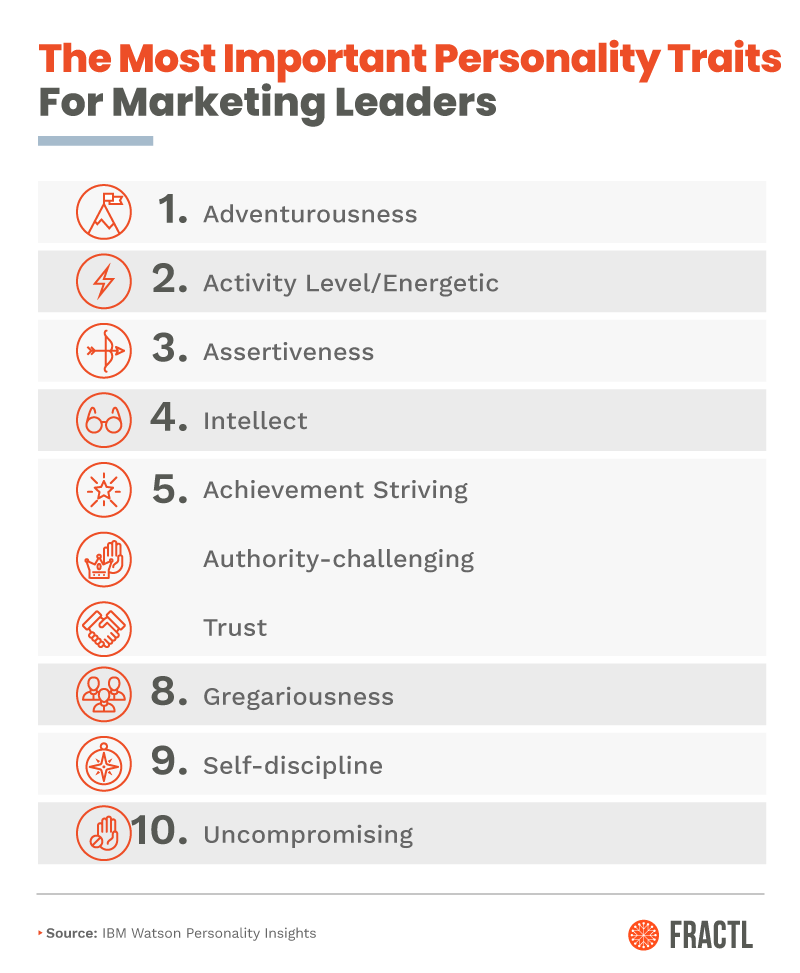Introducing IBM Watson
Named after IBM’s first CEO, Thomas J. Watson, IBM Watson is an advanced computer system designed to answer questions in natural language. You might remember IBM Watson winning Jeopardy! way back in 2011, but what else has the supercomputer been up to since then? Besides helping light up designer dresses for celebrities, creating cooking apps, and perfecting vineyard irrigation, IBM Watson is available for anyone to use. One particularly interesting way you can use Watson technology is by running the Personality Insights API to reveal interesting insights about, well, anyone.
Are you really a digital marketer these days if you don’t have a vibrant online presence showcasing you as one? Fractl wanted to learn more about what personality traits helped take popular marketing leaders to the top of their game, and how seemingly like-minded marketers differ in the nuances of their personalities. We collected tweets from 20 of the most influential digital marketers in 2019 and used IBM Watson to better understand their personalities.
How to Interpret the Results
The IBM Cloud Personality Insights service is “based on the psychology of language in combination with data analytics algorithms.” This allows the API to generate results based on five key characteristics and a wide variety of additional personality traits.
The API explains how to interpret its results in detail here:
“Any score above the mean of 0.5 indicates a greater than average tendency for a characteristic. A score at or above 0.75 indicates readily discernible aspects of the characteristic; such scores are considered high. The opposite statements are true of scores below 0.50 and 0.25, which are considered low.”
Continue reading to hear about our findings.
The Top Personality Traits of 20 Digital Marketing Leaders
We selected twenty leading men and women in the industry. From Ann Handley, to Neil Patel, to Rand Fishkin and more, scroll through the flipbook to see the radar charts all of the marketing leaders we analyzed.
You may notice some similarities between the top traits of marketing leaders—many of the leaders we selected scored high for “Activity level / Energetic.” A prerequisite to being a contagious marketing leader perhaps? We also found that few of the leaders we selected were Prone to Worry. While it’s doubtful that marketing leaders, in particular, have achieved stress-free lives, it could be that they chose not to air their worries out via Twitter and instead keep more private concerns to themselves.
How Do Marketing Leaders Compare?
While radar charts are an excellent way to showcase the complete profile personality of marketing leaders, we cherry-picked a few traits to analyze more deeply in order to better understand how leaders compare to each other for each quality. How much more outgoing is Ann Handley compared to Jay Baer, Amisha Gandhi, or Amy Porterfield? What is it about Darren Rowse that makes him so uncompromising compared to Guy Kawaskaki?
We found that on average, Amy Vernon, Seth Godin, and Gary Vaynerchuk were the most imaginative marketing leaders and that Guy Kawasaki, Sujan Patel, and Tyrona Heath were the most cautious marketing leaders. When it comes to the most intellectual leaders, only two women made the top 10, which makes us question how IBM Watson detects intellect in the API.
The Most Important Personality Traits
While differences between marketing leaders can reveal a lot, what are the character traits that marketing leaders share?
We found that adventurousness was the #1 quality that top marketing leaders score highly for, followed by Activity Level / Energetic, Assertiveness, and Intellect. If your goal is to become a top marketing leader in the future, it might be time to go on an adventure or two.
Conclusion
Just as there are no required prerequisites to being successful in any industry, marketing is no different. All types of personalities can become successful in their chosen field. However, with IBM Watson’s help, we’re able to identify the character traits among marketing’s most beloved personalities that narrow down what it takes to be successful in digital marketing in 2019.
Methodology
For this study, we selected 20 well-known top marketing leaders who provide frequent commentary on the industry online. We gathered Tweets sent from the personal Twitter accounts of the 20 selected marketing leaders. After we’d obtained over 2,500 words, we utilized the IBM Watson Personality Insights API to procure the above findings. In addition to the names mentioned above, we also looked at the Twitter profiles of Aleyda Solis, Jeff Bullas, Mari Smith, Kim Garst, Pam Moore, Michael Brenner, and Olga Andrienko.
Fair Use Statement
We’d like to kindly ask that if you choose to share the above project in part or whole, that you link back to this page so that the creators of this study can be recognized for their work and so that your audience can view the methodology in full.




